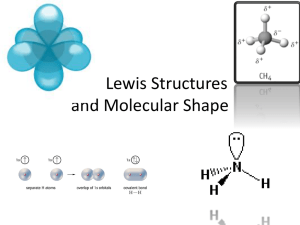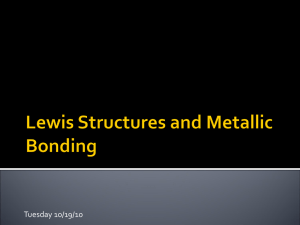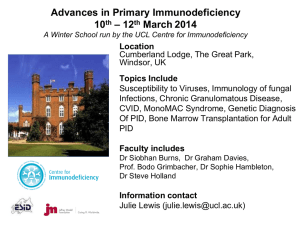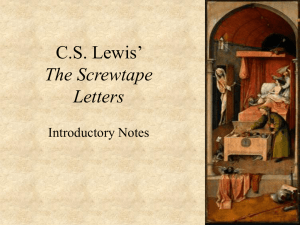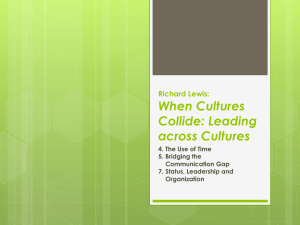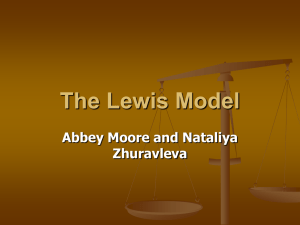The Personal Heresy
advertisement
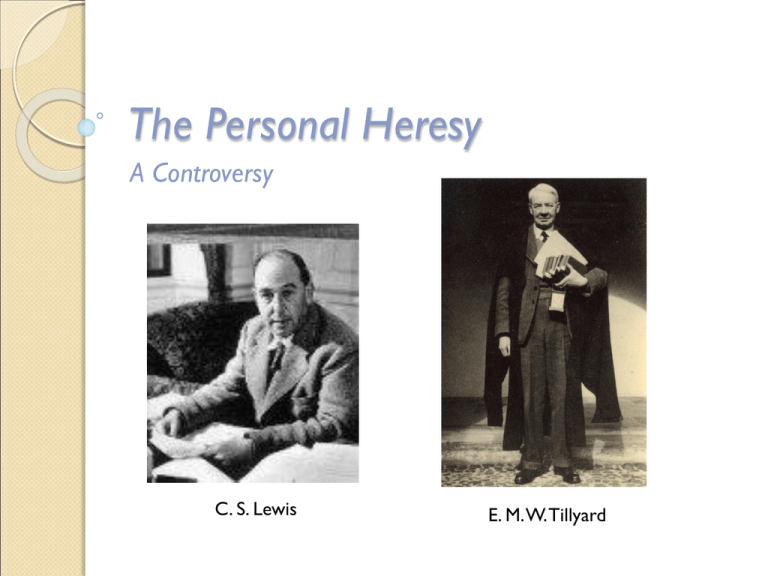
The Personal Heresy A Controversy C. S. Lewis E. M. W. Tillyard Introduction & Chapter I What is the personal heresy and why do both Lewis and Tillyard split time in the book? What is poetry? The poet? (xiv) What is the importance of this argument? How would you rate Lewis’s courtesy toward Tillyard in Chapter One? Wikipedia Chapter I Outline, “The Personal Heresy,” Lewis Example 1: “young soldier poets” Example 2: His Majesty’s Stationery Office (Sir Henry John Newbolt) Example 3: Tillyard’s Milton Example 4: Kingsmill’s Matthew Arnold Example 5: T. S. Eliot Example 6: H. W. Garrod’s Wordsworth CSL Counter-Example 1: Robert Herrick’s “Upon Julia’s Clothes” on the question, “What is it that I see?” Chapter I Outline, “The Personal Heresy,” Lewis CSL Counter-Example 2: Walter De la Mare’s “Very old are …” CSL Counter-Example 3: Wordsworth’s Prelude CSL Counter-Example 4: Isa. 13:19-22 on the question, “What is the nature of this consciousness?” (12) CSL Counter-Example 5: Keats’ Hyperion on the question, “What now remains of the personal dogma?” (17) Chapter I Questions How is the personality of the author twice removed from the poetical experience (7)? What is the topic of this poem by Walter De la Mare? Comment: “It is, in fact, these things, not as they are, but as they seem to be, which poetry represents to me, or so I shall be told” (11). In what sense does the reader come in contact with the poet? Does Lewis think that a poet is a person who sees things in a special way? (20) How important is context? (20) What is the point Lewis makes in regard to the position of the window? (23) How are the materialist and the spiritual theories both fatal to the personal heresy? (24ff.) Chapter II Outline, “Rejoinder,” Tillyard First Preliminary: “slightly shop-soiled” Second Preliminary: no line drawn between lyric and dramatic poetry (drama) Main Argument: the meaning of “personal” and “personality” ◦ ◦ ◦ ◦ ◦ Lewis includes trivial details in personality For Lewis, not the poet’s normal personality Tillyard means “some mental pattern” Tillyard: personality functions in style Example: T. S. Eliot’s The Rock Chapter II Outline, “Rejoinder,” Tillyard Continued ◦ The passage from Isaiah shows the personality of the translator, though not of the author ◦ The paradox: ipsissimus cum minime ipse ◦ Tillyard: Lewis assumes that what is true of communication is also true of the experience ◦ A distinction: fluid (Shakespeare, Flaubert, Keats) and rigid natures (Milton, Wordsworth) ◦ Art vs. Life—connected or disconnected? ◦ Don’t use biography as a shortcut (37), but it can reveal “the mental pattern” (as with William Morris and John Milton) Chapter II Outline, “Rejoinder,” Tillyard Continued ◦ What is poetry about? ◦ Two Observations: First, Tillyard does not limit the value of poetry to the contact with an important personality. Second, Lewis is “too rigidly concerned with things and too little heedful of states of mind” ◦ We learn about the poet’s excited state of mind in “Upon Julia’s Clothes.” He is excited, satisfied, and captivated. Chapter II Questions What is the tone of Tillyard’s essay? (27) Who is the first to be a gentleman? Why? What is implied by making the statement on page 38, line 2, “It may be fairer …:” What is “personality” according to Tillyard and Lewis? Are there examples in the life of Lewis where biographical study could have prevented a critic from making a mistake? (37) Is poetry the result of “the superior penetration of poetic genius”? (38) So what? Chapter II Questions Does Tillyard make any unproven assumptions? Which of the two writers would suggest that the poet’s Art is separated from his Life, and which would suggest that they are connected? What interesting historical note does Tillyard suggest for the translator of Isaiah? (33) The Gunpowder Plot: 1605, Guy Fawkes’ failed attempt to blow up Parliament and assassinate King James I of England and King James VI of Scotland (now celebrated on Guy Fawkes Night, November 5) What is poetry about? Chapter III Vocabulary Hyperuranian (44): a place where only gods can go, non-material Petitio (46): short for petitio principii (“assuming the initial point”), begging the question, e.g., “God exists.” “How do you know?” “Because the Bible says so.” “Why should I believe the Bible?” “Because the Bible was written by God.” The law of Occam’s razor (47): make as few assumptions as possible “willing suspension of disbelief” (51): from Coleridge, suspending judgment that what we are reading could not have happened Common room (56): shared lounge (British term) Chapter III Outline, “Open Letter,” Lewis Hungry for “rational opposition” Graciousness in the opening paragraph Recantation: (1) positions on Tillyard and Eliot; (2) that it is a new heresy; (3) Lewis’s interpretation of the Isaiah passage Four Main Heads ◦ A distinction in the definition of personality ◦ The paradox of poetic creation ◦ Confusing the means of communication with that which is communicated ◦ Preference of things to people Things He Skips Lewis will not pursue Tillyard’s distinction between fluid and rigid personalities (42) Lewis will not develop his presuppositions about the material world and the spiritual world (43) First Main Head A distinction in the definition of personality (44-45) ◦ Personality needs to stay in its right place ◦ Personality includes little things, trivial things ◦ Personality includes warmth, humanity, intimacy, the real rough and tumble of life But are these things valuable because they are certain patterns or because of the things seen through them? Second Main Head The paradox of poetic creation (46-48) ◦ Great art is unique ◦ So is every moment of time ◦ This begs the question (Great art is unique. Because it’s unique, therefore it’s great.) ◦ Don’t confuse individuality with personality Third Main Head Confusing the means of communication with that which is communicated (49) ◦ Lewis says that he based “that which is communicated” on a separate argument from “the means of communication,” and he blames himself for not making that clear. Fourth Main Head Preference of things to people (49-56) ◦ The claim is false, but Lewis blames himself again. ◦ “To think of literature is to think first and foremost” of people (49). ◦ Lewis focused on silk to make the argument simple. He doesn’t think it’s this simple. ◦ Lewis grants that Herrick is interested in Julia, not just silk. But also not his own reactions to Julia in silk. Fourth Main Head (continued) Preference of things to people (49-56) ◦ Not about art in general, but about imaginative literature ◦ Private letters and some essays are about the writer’s personality ◦ The poet’s personality intrudes into an imagined world. ◦ We don’t owe a poet an aesthetic response, but we do owe it to his poetry. ◦ Lewis likes Dryden’s poetry, but not Dryden. Fourth Main Head (continued) Three Dilemmas, or, Three Ways of Offending against Personality (part of the preference of things to people) ◦ Logic vs. imagination: Personality forces us out of the world of poetry and into the world of logic and ethics. ◦ It is uncivil to think about the person instead of what he says. ◦ Poetolatry: the idolatry of poetry (loving poets rather than appreciating their poetry) Chapter III Questions How would you characterize Lewis’s opening and closing paragraphs? What is “the proper pleasure of personality” (52, top)? So what? What is poetolatry? Why is it an issue? How does it surface? How many times does Lewis use the word “Sir,” and what does this mean? What startling prediction did Matthew Arnold make about poetry? Is beauty really in the eye of the beholder? Chapter III Questions Is personality a mental pattern or various details? What is personality according to Lewis? What is absurd about the triad Christ, Shakespeare, and Keats? What is Lewis echoing on p. 56 when he writes about “an emotion whose true object is our neighbor”? Is there a difference between something that is an expression of personality and something that expresses personality? Is Lewis or Tillyard more likely to be described as an elitist? So what? Chapter IV Vocabulary enisle = “to make an island of,” “to isolate” (67) Chapter IV Outline, No Title, Tillyard I. Clarifications: “personal” is not equivalent to the “concrete”; Tillyard did not think Lewis oblivious to Julia ◦ But Tillyard thinks the poet’s reaction still possibly “the poet’s main concern” (60). ◦ Tillyard illustrates this with “The Mower to the Glowworms” II. Apologies: (1) Tillyard’s accusation about seeing only half of a paradox was merely accusing Lewis of not agreeing with him (the poet is most himself when surrendering self) (61, bottom); (2) Tillyard withdraws the charge that Lewis confused communication with the thing communicated; (3) Tillyard pleads guilty of vagueness over the uniqueness of the Delphic Charioteer. Chapter IV Outline, No Title, Tillyard III. Different Senses of Uniqueness ◦ Something not likely to recur (63) ◦ A sense of unity and individuality (63) ◦ A sense of kinship and sharing (64) IV. The Distinction between Life and Art A personal impression: Romanesque churches in Auvergne, France Auvergne = 16; Paris = 6 Chapter IV Outline, No Title, Tillyard This personal impression is an example of sharing, much like one sees things differently, in heightened apprehension, when one views a sunset in company vs. in solitaire. V. The Value of Personality in Literature ◦ First, the flow of sympathy between author and reader (67), as in Wordsworth, “a superior person” ◦ Footnote on two classes of trivial details, the essential stammer (CSL and EMWT agree on this) and the unessential stammer ◦ Second, mental pattern in both life and art, governed by predispositions that affect both life and art, as in Keats’ Hyperion Chapter IV Outline, No Title, Tillyard VI. More on Life and Art The dead poet can do something for us (73f.); he or she can set an example, which brings comfort and courage. The dead poet is also “one who has inhabited heavens and hells unbearable by the ordinary man” (Examples: Shakespeare, Baudelaire, Marvell, & Herrick) In some poets, this counts for little (Tennyson, 77). Chapter IV Outline, No Title, Tillyard Summary: The two functions of personality in literature are (1) a kind of sharing and (2) setting an example. Can our differences be “resolved into no more than a matter of terminology”? (78) A question from Tillyard to Lewis: What does the author’s personality express, i.e. what is literature? Chapter IV Questions What evidence do you find of Tillyard’s graciousness? Did Tillyard truly share something with the man who designed that Romanesque church? What evidence can you give for your answer? Is the poet “a cut above” or one of the common people? (see “a superior person,” 68, top) What does Tillyard say personality is good for in literature? What do you think Lewis will say to this? What difference does this issue make? Is it impossible for an agricultural laborer saved from will-o’-the-wisps by glow-worms to help us appreciate rural life (61, middle)? Chapter IV Questions Might the difference between Tillyard and Lewis simply be a preference for feelings by Tillyard and objective things by Lewis? What is meant by “the formidable battery of Mr. Lewis’s dialectic” (62, top)? Why do you think Tillyard says this and in this way? What is the point of talking about the distinction between life and art (65, bottom)? What do you think Lewis will say about Tillyard seeing value in the idea of sharing an experience with the poet? (67f.) Chapter V Vocabulary qua = insofar as “making shift” = to manage by expedience (82) “the apple of discord” = Chapter I, which was written in 1933 and published in a 1934 issue of Essays and Studies (82) jejune = dull Chapter V Outline, No Title, Lewis I. Three Senses of Unique (79) II. Two Agreements: The Poet’s Example and Sharing III. Two Kinds of Poetry ◦ Common experiences that all people have. ◦ A new and nameless sensation, or experiences that enrich one. IV. Lewis’s Theory of Poetry: a trained habit (art or skill) of using certain instruments (the extralogical features of language, 85, 89) to certain ends (the concrete reality of experiences, 89) and doing it well (90): definition and content of poetry Chapter V Outline, No Title, Lewis V. Lewis on Naturalism (interspersed with IV) V.I Two Types of Language (89) ◦ Scientific or philosophical language ◦ Poetic language VII. The Content of Poetry (92) ◦ Not about proving anything ◦ Not about a practical purpose ◦ Otherwise, about anything and everything Chapter V Outline, No Title, Lewis VIII. The Great Poet (94): Is he or she . . . ◦ A great man who is also a poet, or ◦ A man highly skilled in poetry (CSL here?) IX. The Value of Poetry? X. Qualifications of the Right Judges: none (96) XI. What Poetry Requires to be Understood by the Average Reader ◦ Pleasure ◦ Profit Chapter V Questions What is Lewis referring to, which we have read earlier, when he writes of “some want within” (79, bottom)? What do Lewis and Tillyard think of “common things and common men” (80), at least in the opinion of Lewis? Why? Comment: “trailing clouds of glory” (80) How does Lewis define poetry? A poem? Is poetry the creation of something new or the expression of common experience? Chapter V Questions Of the two definitions offered, what is Lewis’ preferred definition of a great poet? So what? Whom does Lewis prefer, Mr A or Mr. B (97)? Why? Whom do you prefer? Is reading poetry like the sharing of two lovers or the sharing of two friends? Why? So what? Chapter V Questions What is Lewis seeing in the second type of poetry that is not part of the essence of poetry, but illustrates much of Lewis’ writing (85)? What does Lewis think of the courage of some poets (88)? What evidence is there in this work that Lewis had a Christian sub-text? Do we have a tendency to inflate the importance of what we do? Chapter V Questions On page 87, Lewis writes, “What man, after forty years in the world, has not experienced enough (if that were all that was needed) to be raw material for all the tragedies of Shakespeare?” What do terms such as “insincere,” “spurious,” “bogus,” and “sham” suggest about a reviewer (98)? How can one read this chapter and commit the personal heresy? How can one read this chapter and not commit the personal heresy? Chapter VI Vocabulary kestrel = falcon chimerical = imaginary Carl Jung = author of the collective unconscious, where archetypes resided (116) Archetypes = a universally recognized symbol, pattern, or example Chapter VI Outline, No Title, Tillyard I. Two Kinds of Sharing (sharing with authors vs. sharing with nature) II. The Exemplary Function (Agreement) III. Two Kinds of Poetry (Agreement) IV. Poetolatry (Agreement, but …) V. Definition of Poetry (Agreement, but…) VI. What Poetry is About (108ff.) ◦ ◦ ◦ ◦ ◦ Rendering personality (113f.) General states of mind (114) Feelings (and history) (114) Something new (115) Something old (115) VII. An Agreement: Plea for the Common Reader Chapter VI Questions Does Tillyard say anything to suggest that poets are “a class apart”? Is there any “harm in paying respect to those qualities they possess in an eminent degree”? (107) How are both Tillyard and Lewis correct in stating that the poet is separate (Tillyard) or not separate (Lewis) from the common person? (104) How does the exchange between Lewis and Tillyard compare to the current political discourse in the United States? Chapter VI Questions How does Tillyard quote Somerset Maugham in his favor? What percentage (Tillyard declines to hazard a guess) of a piece of poetry do think that Tillyard would say has to do with personality? (see last paragraph on p. 113 continuing onto p. 114) So whose case on personality in poetry is stronger and why? So what? The End
